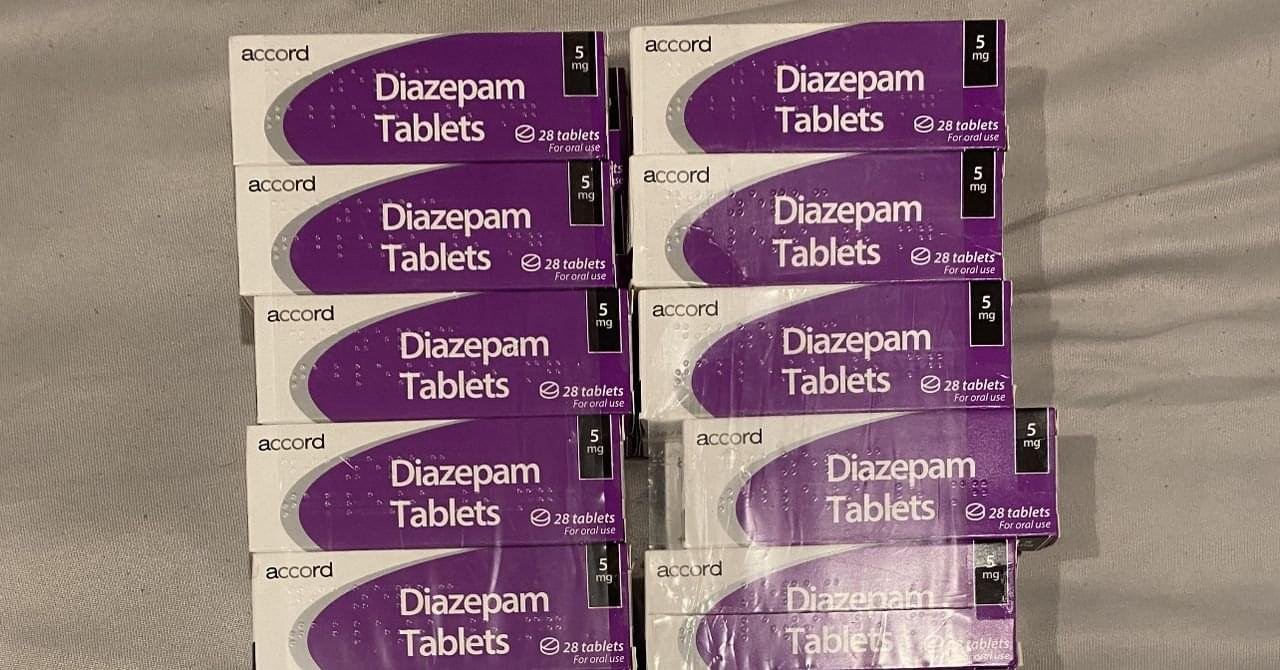diazepam 5mg
$140.00 – $280.00Price range: $140.00 through $280.00
Experience tranquility with Diazepam. This anxiety-relieving medication enhances neurotransmitter activity in the brain, providing a calming effect. Let go of stress and embrace a peaceful state of mind.
Exploring Diazepam 5mg: Where to Buy and How It Works
Diazepam, commonly recognized under the brand name Valium, is a versatile medicine aimed at managing anxiety, seizures, muscle discomfort, and the challenges of alcohol withdrawal [1]. It forms a crucial part of the benzodiazepine drug class, operating by boosting GABA neurotransmitter activity, thus pacifying the nervous system [1] [4].
Considering the need to understand precisely where to buy Diazepam or Valium, this article will also illustrate how it functions within the body to offer relief from various symptoms. The focus will not only be on safe acquisition methods including pharmacies and online platforms but also on ensuring chosen sources offer professional medical advice and the lowest prices for Valium and its variants [4].
Understanding Diazepam 5mg
Diazepam, marketed under the brand name Valium, is a versatile medication with multiple applications, including anxiety management, alcohol withdrawal symptom relief, and muscle spasm treatment. Understanding its pharmacokinetics and pharmacodynamics is crucial for both healthcare professionals and patients.
- Forms and Absorption:
- Metabolism and Excretion:
-
- Metabolized primarily by CYP3A4 and 2C19 into active metabolites, including N-desmethyldiazepam and temazepam [4].
- Exhibits a plasma half-life extension in neonates, the elderly, and individuals with kidney or liver disease [4].
- Clearance rate is 20 to 30 mL/min in young adults, indicating efficient processing by the body [4].
- Mechanism of Action and Dosage:
-
- Increases gamma-aminobutyric acid (GABA) activity in the brain, leading to a calming effect [5].
- Dosage varies by age and condition, with typical starting doses ranging for different conditions and age groups [8].
- Not intended for long-term use due to the risk of dependence, with common side effects including drowsiness and muscle weakness [8][6].
This detailed breakdown offers insight into diazepam’s comprehensive profile, highlighting its therapeutic potential and considerations for safe use.
Medical Uses of Diazepam 5mg
Diazepam 5mg serves a versatile role in medical treatment, addressing a range of conditions effectively. Its applications include:
- Anxiety Disorders and Short-term Anxiety Symptoms:
- Alcohol Withdrawal Symptoms:
- Muscle Spasms and Seizures:
Diazepam is generally recommended for short-term use, not exceeding 4 weeks, to avoid dependency and severe side effects upon cessation [3]. This careful consideration ensures the medication’s benefits are maximized while minimizing potential risks.
Precautionary Measures and Side Effects
When considering the use of Diazepam 5mg, it is essential to be aware of precautionary measures and potential side effects to ensure safe and effective treatment:
Common and Serious Side Effects:
- Common Side Effects: Drowsiness, dizziness, tiredness, blurred vision, unsteadiness [1].
- Serious Side Effects: Include mental/mood changes, trouble speaking, walking difficulties, muscle weakness, shaking, trouble urinating, yellowing eyes/skin, signs of infection, slow/shallow breathing [1].
Risk Factors and Interactions:
- Abuse and Addiction: Diazepam has a risk for abuse and addiction. Abruptly stopping the medication may lead to potentially fatal withdrawal symptoms [1].
- Interactions: Diazepam may interact with sedatives, sleeping pills, tranquilizers, valproic acid, and can cause dangerous sedation when combined with opioids and alcohol [2][5].
Precautionary Measures:
- Pregnancy and Breastfeeding: Diazepam may harm an unborn baby, and breastfeeding is not recommended while using this medication [1].
- Withdrawal Symptoms: May include nausea, vomiting, diarrhea, shaking. It is crucial to reduce the dose gradually under medical supervision when stopping the medication [12].
Understanding these aspects is vital for anyone considering or currently using Diazepam 5mg, ensuring they are fully informed of the benefits and risks associated with this medication.
How to Use Diazepam 5mg Safely
To ensure safe and effective use of Diazepam 5mg, adhere to the following guidelines:
- Administration and Dosage Instructions:
-
- Always take Diazepam as directed by your healthcare provider. Do not adjust the dosage without professional consultation [2].
- Diazepam can be ingested with or without food. If stomach upset occurs, try taking it with food to improve tolerance [1].
- The dosage is tailored to individual medical conditions, age, and treatment response. It’s critical to strictly follow the prescribed dosage to avoid adverse effects [1].
- For oral consumption, swallow the tablet whole without crushing, breaking, or chewing it to ensure proper drug release [9].
- When using the oral solution, measure your dose with the provided dropper, mix it with a small amount of liquid or semisolid food, and consume the entire mixture immediately without saving any for later use [9].
- Missed Dose and Storage:
-
- If a dose is missed, take it as soon as possible unless it’s close to the time for your next dose. In such cases, skip the missed dose and resume your usual dosing schedule. Avoid doubling up on doses [9].
- Store Diazepam in a closed container at room temperature, away from excess heat, moisture, and direct light to maintain its efficacy. Ensure it is kept out of reach of children and pets [9][2].
- Disposal:
-
- Proper disposal of Diazepam is crucial. Do not flush medications down the toilet or pour them into a drain unless instructed to do so. Utilize a medicine take-back program for safe disposal, if available [2].
By following these guidelines, patients and caregivers can maximize the therapeutic benefits of Diazepam 5mg while minimizing the risk of side effects and ensuring the medication’s integrity is preserved.
Conclusion
Through the exploration of Diazepam 5mg, its inclusive use in addressing anxiety, alcohol withdrawal symptoms, muscle spasms, and seizures has been detailed, highlighting its significant role in the medical field. The effectiveness of Diazepam, when utilized according to prescribed guidelines, illuminates its therapeutic potential. However, the importance of adhering to precautionary measures, being acutely aware of its side effects, and the necessity of a meticulous approach towards dosage, storage, and disposal practices ensures both safety and efficiency in its administration.
The discourse surrounding Diazepam 5mg emphasizes not only its clinical relevance but also underscores the critical need for responsible usage, considering the risks of abuse and addiction. As such, this discussion serves as a comprehensive guide for potential users and healthcare professionals alike, encouraging informed decisions and vigilant management of Diazepam’s application. This narrative, rooted in an understanding of Diazepam’s pharmacokinetics and therapeutic applications, paves the way for ongoing research and dialogue around benzodiazepines and their place in contemporary medicine.
FAQs
What should I anticipate when taking diazepam for the first time?
When you first start taking diazepam, you may experience memory issues, drowsiness, and difficulty concentrating. If you have upcoming exams or important tasks, discuss with your doctor the possibility of postponing the commencement of diazepam until after these events.
How does a 5mg dose of diazepam function?
Diazepam 5mg operates by boosting the levels of a neurotransmitter known as gamma-aminobutyric acid (GABA), which has a calming effect on the brain. Diazepam is only available with a doctor’s prescription and can be taken in various forms, including tablets, a swallowable liquid, or as a rectal tube medication.
What is the non-brand equivalent of diazepam?
The non-brand, or generic, name for Valium is diazepam, while the generic name for Xanax is alprazolam. Both medications are used to treat anxiety, which can often stem from a chemical imbalance in the brain.
For how long will a 5mg dose of diazepam remain effective?
The active effects of a 5mg dose of diazepam typically last between four to six hours. However, the drug can be detected in the body for a much longer period. The half-life of a 5mg dose of Valium is approximately 50 hours, but trace amounts can be found in the body for up to 90 days, depending on the testing method used.
| Weight | 50 pills, 100 pills |
|---|
Be the first to review “diazepam 5mg”
Related products
Pills
Pills
Pills
Pills
Pills
Pills
Pills
Pills


Reviews
There are no reviews yet.